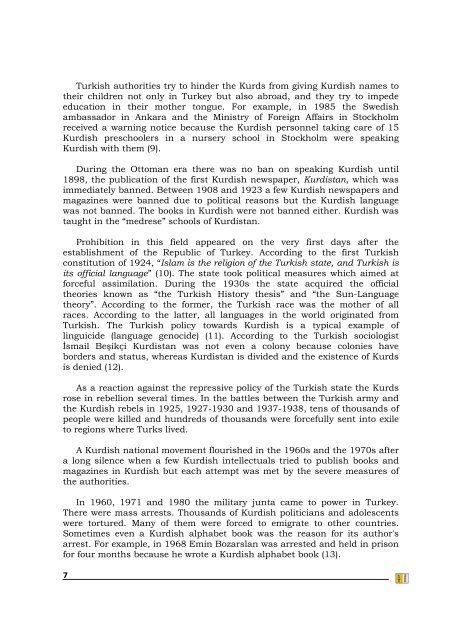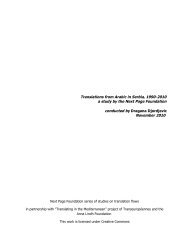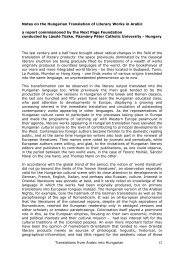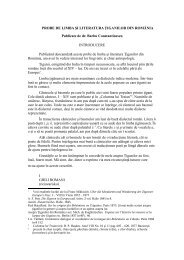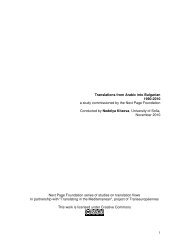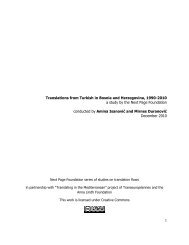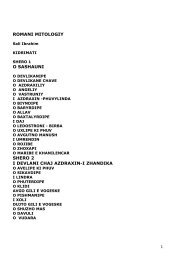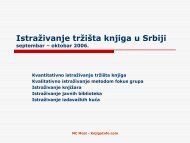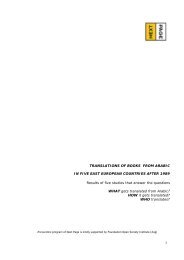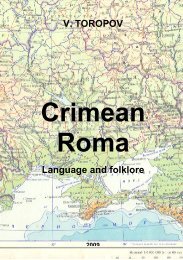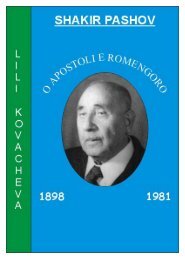the past and the present of book publishing in kurdish language in ...
the past and the present of book publishing in kurdish language in ...
the past and the present of book publishing in kurdish language in ...
Create successful ePaper yourself
Turn your PDF publications into a flip-book with our unique Google optimized e-Paper software.
Turkish authorities try to h<strong>in</strong>der <strong>the</strong> Kurds from giv<strong>in</strong>g Kurdish names to<strong>the</strong>ir children not only <strong>in</strong> Turkey but also abroad, <strong>and</strong> <strong>the</strong>y try to impedeeducation <strong>in</strong> <strong>the</strong>ir mo<strong>the</strong>r tongue. For example, <strong>in</strong> 1985 <strong>the</strong> Swedishambassador <strong>in</strong> Ankara <strong>and</strong> <strong>the</strong> M<strong>in</strong>istry <strong>of</strong> Foreign Affairs <strong>in</strong> Stockholmreceived a warn<strong>in</strong>g notice because <strong>the</strong> Kurdish personnel tak<strong>in</strong>g care <strong>of</strong> 15Kurdish preschoolers <strong>in</strong> a nursery school <strong>in</strong> Stockholm were speak<strong>in</strong>gKurdish with <strong>the</strong>m (9).Dur<strong>in</strong>g <strong>the</strong> Ottoman era <strong>the</strong>re was no ban on speak<strong>in</strong>g Kurdish until1898, <strong>the</strong> publication <strong>of</strong> <strong>the</strong> first Kurdish newspaper, Kurdistan, which wasimmediately banned. Between 1908 <strong>and</strong> 1923 a few Kurdish newspapers <strong>and</strong>magaz<strong>in</strong>es were banned due to political reasons but <strong>the</strong> Kurdish <strong>language</strong>was not banned. The <strong>book</strong>s <strong>in</strong> Kurdish were not banned ei<strong>the</strong>r. Kurdish wastaught <strong>in</strong> <strong>the</strong> “medrese” schools <strong>of</strong> Kurdistan.Prohibition <strong>in</strong> this field appeared on <strong>the</strong> very first days after <strong>the</strong>establishment <strong>of</strong> <strong>the</strong> Republic <strong>of</strong> Turkey. Accord<strong>in</strong>g to <strong>the</strong> first Turkishconstitution <strong>of</strong> 1924, “Islam is <strong>the</strong> religion <strong>of</strong> <strong>the</strong> Turkish state, <strong>and</strong> Turkish isits <strong>of</strong>ficial <strong>language</strong>” (10). The state took political measures which aimed atforceful assimilation. Dur<strong>in</strong>g <strong>the</strong> 1930s <strong>the</strong> state acquired <strong>the</strong> <strong>of</strong>ficial<strong>the</strong>ories known as “<strong>the</strong> Turkish History <strong>the</strong>sis” <strong>and</strong> “<strong>the</strong> Sun-Language<strong>the</strong>ory”. Accord<strong>in</strong>g to <strong>the</strong> former, <strong>the</strong> Turkish race was <strong>the</strong> mo<strong>the</strong>r <strong>of</strong> allraces. Accord<strong>in</strong>g to <strong>the</strong> latter, all <strong>language</strong>s <strong>in</strong> <strong>the</strong> world orig<strong>in</strong>ated fromTurkish. The Turkish policy towards Kurdish is a typical example <strong>of</strong>l<strong>in</strong>guicide (<strong>language</strong> genocide) (11). Accord<strong>in</strong>g to <strong>the</strong> Turkish sociologistİsmail Beşikçi Kurdistan was not even a colony because colonies haveborders <strong>and</strong> status, whereas Kurdistan is divided <strong>and</strong> <strong>the</strong> existence <strong>of</strong> Kurdsis denied (12).As a reaction aga<strong>in</strong>st <strong>the</strong> repressive policy <strong>of</strong> <strong>the</strong> Turkish state <strong>the</strong> Kurdsrose <strong>in</strong> rebellion several times. In <strong>the</strong> battles between <strong>the</strong> Turkish army <strong>and</strong><strong>the</strong> Kurdish rebels <strong>in</strong> 1925, 1927-1930 <strong>and</strong> 1937-1938, tens <strong>of</strong> thous<strong>and</strong>s <strong>of</strong>people were killed <strong>and</strong> hundreds <strong>of</strong> thous<strong>and</strong>s were forcefully sent <strong>in</strong>to exileto regions where Turks lived.A Kurdish national movement flourished <strong>in</strong> <strong>the</strong> 1960s <strong>and</strong> <strong>the</strong> 1970s aftera long silence when a few Kurdish <strong>in</strong>tellectuals tried to publish <strong>book</strong>s <strong>and</strong>magaz<strong>in</strong>es <strong>in</strong> Kurdish but each attempt was met by <strong>the</strong> severe measures <strong>of</strong><strong>the</strong> authorities.In 1960, 1971 <strong>and</strong> 1980 <strong>the</strong> military junta came to power <strong>in</strong> Turkey.There were mass arrests. Thous<strong>and</strong>s <strong>of</strong> Kurdish politicians <strong>and</strong> adolescentswere tortured. Many <strong>of</strong> <strong>the</strong>m were forced to emigrate to o<strong>the</strong>r countries.Sometimes even a Kurdish alphabet <strong>book</strong> was <strong>the</strong> reason for its author'sarrest. For example, <strong>in</strong> 1968 Em<strong>in</strong> Bozarslan was arrested <strong>and</strong> held <strong>in</strong> prisonfor four months because he wrote a Kurdish alphabet <strong>book</strong> (13).7


